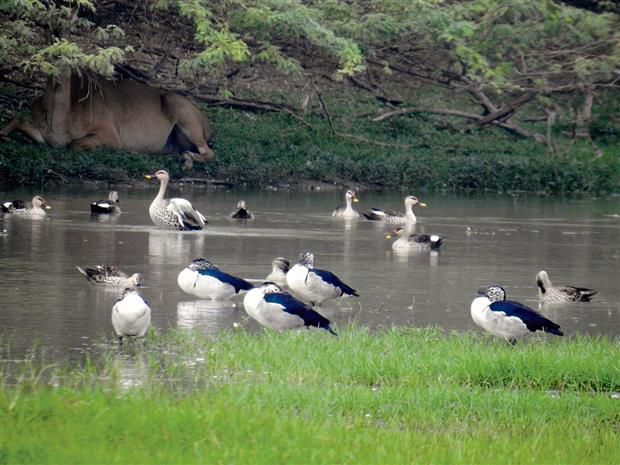Aksheev Thakur
New Delhi, June 29
The dry wetlands of Sultanpur National Park and Najafgarh Jheel are witnessing a significant decline in water bird species due to climate change and poor management. This has resulted in zero breeding activity at the two wetlands.
Speaking to Delhi Tribune, ornithologist TK Roy said, “Sultanpur National Park in NCR is popular for its diverse species of birds, but due to climate change and poor management, the area around the wetland has dried up, except for a middle portion. Currently, only 15 species of resident water birds are present in smaller numbers, compared to the usual 20 to 25 species, even though the park remains closed to visitors during the annual breeding season from June to September.”
‘Only 15 species of resident birds’
Sultanpur National Park is popular for its diverse species of birds, but the area around the wetland has now dried up, except for a middle portion. Currently, only 15 species of resident water birds are present in smaller numbers, compared to the usual 20 to 25 species. — TK Roy, Ornithologist
Birds such as Little Cormorant, Comb Duck, Oriental Darter, Painted Stork, Black-headed Ibis, Red-wattled Lapwing, Cattle Egret, Little Egret, Indian Pond Heron, Sarus Crane, Asian Openbill, Common Moorhen, Purple Swamphen, Pheasant-tailed Jacana and Indian Spot-billed Duck are now mostly confined to the middle portion of the wetland.
Roy pointed out that there has been no nesting or breeding of resident species like Little Cormorant, Indian Cormorant, Oriental Darter, Comb Duck, Cattle Egret, Little Egret, Grey Heron, Purple Heron, Indian Pond Heron, Black-headed Ibis, Black-crowned Night Heron, Common Moorhen, Purple Swamphen and Pheasant-tailed Jacana in the park.
Sultanpur National Park was recognised as a Ramsar site, a wetland of national importance, in 2021. Najafgarh Jheel, the second largest wetland in NCR, also faces similar issues.
During winter, thousands of migratory water birds visit this wetland for breeding. However, Roy observed that this wetland has also dried up due to the impact of climate change and lack of management by the government.
“The dried area of the wetland is being used for agriculture during the summer-monsoon season by villagers. Ten species of resident water birds are present in small numbers, but surprisingly, a large flock of over 150 Greater Flamingos is available now instead of the usual 25 to 30 species,” observed Roy.
“Even here, there is no annual summer nesting and breeding of the resident species this time due to the destruction of the naturally grown Acacia tree patches along the wetland bank by the government for development work,” he added.
The dry wetland is home to a diminished number of resident bird species, including Indian Spot-billed Duck, Little Cormorant, Red-wattled Lapwing, Cattle Egret, Little Egret, Common Moorhen, Purple Swamphen, Indian Pond Heron, and Grey Heron. However, a large flock of Greater Flamingos can still be found there. Roy suggested that authorities concerned should step in for the management of the wetlands.









